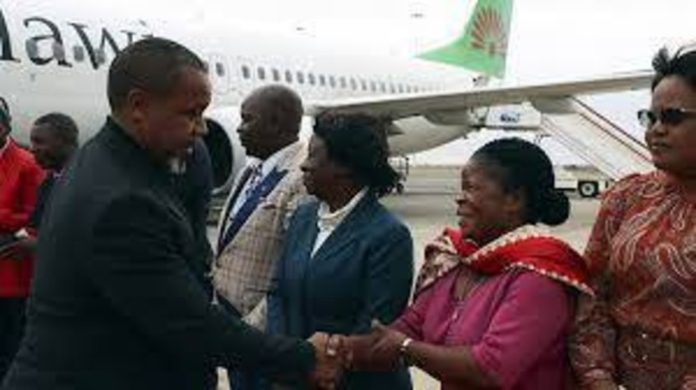Soldiers are combing through mountainous forests near a city in northern Malawi following the disappearance of a military plane carrying the country’s Vice President and a former First Lady. President Lazarus Chakwera disclosed the ongoing search efforts after the aircraft vanished from radar on Monday.
The aircraft, carrying 51-year-old Vice President Saulos Chilima, former First Lady Shanil Dzimbiri, and eight others, departed from the capital, Lilongwe, at 9:17 a.m. Its intended destination was Mzuzu International Airport, located approximately 370 kilometers (230 miles) to the north. However, air traffic control instructed the plane to abort its landing due to adverse weather conditions and poor visibility.
Chakwera, in a televised address on the state TV channel MBC, revealed that contact with the aircraft was lost shortly after the air traffic control’s instructions. Despite concerted search efforts, the plane remained untraceable, prompting concerns and fears for the safety of those on board.
Acknowledging the gravity of the situation, Chakwera expressed empathy for the anxiety and apprehension gripping the nation. He assured the public of the government’s unwavering commitment to deploying all available resources in the search and rescue operation. The President conveyed a message of hope, emphasizing his determination to exhaust every avenue in the quest for survivors.
The disappearance of the military plane has sent shockwaves across Malawi, prompting an outpouring of concern and solidarity from citizens. The incident has underscored the inherent risks associated with air travel, particularly in regions prone to adverse weather conditions and challenging terrain.
As search efforts intensify, the fate of Vice President Chilima, former First Lady Dzimbiri, and the other passengers remains uncertain. The unfolding crisis has highlighted the importance of swift and coordinated emergency response mechanisms in mitigating the impact of aviation emergencies.
The disappearance of the aircraft has reignited discussions around aviation safety standards and protocols in Malawi. Questions have been raised about the adequacy of weather forecasting systems and the preparedness of air traffic control agencies to handle adverse weather conditions.
Amidst the uncertainty and anxiety, communities have rallied together in solidarity, offering support to the families and loved ones of the missing passengers. Vigils and prayer gatherings have been organized across the country, as people hold onto hope for a positive outcome.
In the midst of the search operation, authorities are also grappling with the logistical and operational challenges posed by the rugged terrain and dense forests in the vicinity of the last known location of the aircraft. Helicopters, drones, and ground teams have been deployed to scour the area for any signs of wreckage or survivors.
The disappearance of the military plane has cast a shadow over the political landscape of Malawi, with Vice President Chilima being a prominent figure in the country’s leadership. The uncertainty surrounding his fate has left the nation in a state of limbo, awaiting updates and developments from the ongoing search efforts.
As the search continues, hopes and prayers are directed towards the safe return of the missing passengers. The resilience and unity displayed by the people of Malawi in the face of adversity serve as a testament to the strength of the nation’s spirit in times of crisis.























